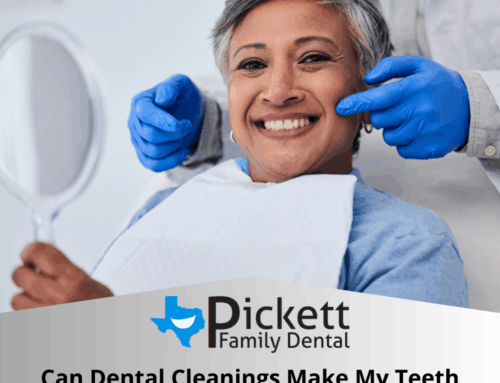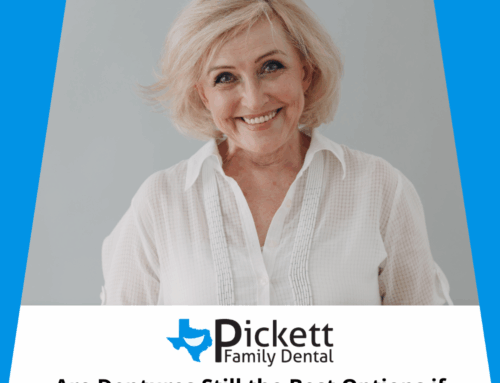As we age, maintaining oral health becomes even more essential—not just for a confident smile, but for overall well-being. In your 50s and 60s, restorative dentistry plays a key role in supporting quality of life, preventing future health problems, and helping you enjoy daily activities like eating, speaking, and smiling.
At Pickett Family Dental in Keller, TX, we often work with patients in this stage of life who are ready to address long-standing dental issues or are experiencing new concerns related to aging teeth and gums. Whether you’re dealing with worn restorations, missing teeth, or general wear and tear, restorative dentistry offers practical, health-focused solutions that improve your function and prevent more complex problems down the road.
Here’s a closer look at the many health benefits of restorative dental care in your 50s, 60s, and beyond.
Restoring Function: Chewing, Speaking, and Smiling with Ease
One of the most immediate benefits of restorative dentistry is the return of normal function. If you’re missing teeth, have worn crowns, or are experiencing pain from decay or damage, daily activities like chewing, speaking, or even smiling can become difficult and uncomfortable.
Treatments such as:
-
Dental crowns
-
Bridges
-
Implants
-
Implant-supported dentures
can rebuild your bite and restore your ability to eat a variety of foods without discomfort. This not only enhances quality of life but also supports your nutritional health, which becomes increasingly important as we age.

Improved Nutrition and Digestion
Good digestion starts in the mouth. Chewing breaks down food into smaller particles and mixes it with enzymes in your saliva. When teeth are missing, sensitive, or misaligned, it can lead to improper chewing, which affects your ability to digest and absorb nutrients.
Many older adults begin avoiding foods that are too hard, crunchy, or chewy—often the very foods that are rich in vitamins and fiber. This can lead to a restricted diet and nutritional deficiencies over time.
By restoring damaged or missing teeth, restorative dentistry helps you maintain a well-balanced diet, supporting energy levels, immune function, and overall vitality in your 50s and 60s.
Preventing Further Tooth Loss and Bone Deterioration
Tooth loss can cause a ripple effect. When one tooth is lost, the surrounding teeth may begin to shift, tilt, or become loose. The gap in the gums becomes a hotspot for bacteria, increasing the risk of decay and gum disease in adjacent teeth.
Additionally, when teeth are missing, the jawbone beneath them begins to shrink due to lack of stimulation—a process called bone resorption. Over time, this can lead to a sunken facial appearance and complicate future dental treatments.
Dental implants, in particular, are one of the only restorative solutions that help prevent bone loss by stimulating the jawbone just like a natural tooth root. For patients in their 50s and 60s, replacing missing teeth promptly can protect both bone density and facial structure.
Supporting Speech and Confidence
Many people don’t realize how much teeth contribute to clear speech until they’re missing one or more. Restorative dental treatments—especially dentures, bridges, and implants—help restore proper tongue placement and airflow, which can significantly improve articulation and clarity.
Beyond the functional aspects, restoring your smile also has emotional and social benefits. A complete, healthy smile can boost self-confidence, reduce self-consciousness, and encourage more social engagement—which is strongly linked to emotional well-being and even longevity.
Reducing Chronic Inflammation and Systemic Health Risks
Oral infections, untreated tooth decay, and gum disease all contribute to chronic inflammation, which has been linked to a number of systemic conditions, including:
-
Heart disease
-
Diabetes
-
Respiratory issues
-
Cognitive decline
-
Stroke
Restorative dentistry helps eliminate sources of infection and decay, allowing your body to focus on healing and maintaining a healthy immune system. Especially in your 50s and 60s, when the risk for systemic disease increases, a healthy mouth contributes to a healthier body.
Saving Money with Proactive Care
One of the most overlooked benefits of restorative dentistry is the long-term savings. While it may seem more affordable to delay treatment or live with missing teeth, the costs of emergency procedures, bone loss, or full-mouth rehabilitation often far outweigh the investment in preventive or early restorative care.
By treating problems early—such as replacing a failing crown or getting an implant before bone loss progresses—you avoid more complex (and costly) procedures later. At Pickett Family Dental, we work with patients to create treatment plans that fit their timeline and budget while prioritizing long-term health.
Restorative Dentistry Tailored for Mature Adults
At Pickett Family Dental, we understand the unique challenges that come with maintaining oral health in your 50s and 60s. Teeth may have experienced decades of use, and restorations like old crowns or fillings may need updating. Medications, dry mouth, or medical conditions may also be contributing to increased risk for decay or gum issues.
That’s why we take a personalized approach, using advanced diagnostics, gentle techniques, and durable materials to help our patients preserve their health and independence as they age.
Take the Next Step Toward a Healthier Smile
Whether you’re managing tooth loss, worn-down dental work, or looking to improve your quality of life, restorative dentistry offers real, lasting benefits. You don’t have to live with discomfort or limit your lifestyle because of your teeth.
At Pickett Family Dental in Keller, TX, we’re here to help you rebuild, restore, and protect your smile—so you can continue living fully and confidently in your 50s, 60s, and beyond.
Schedule your consultation today and take the first step toward a stronger, healthier future for your smile.



